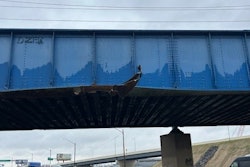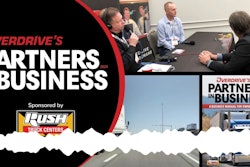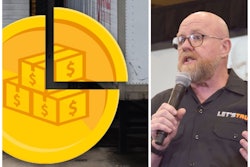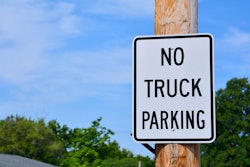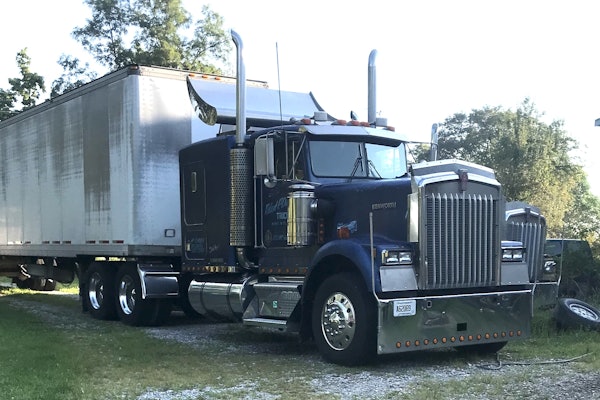It can happen to the best of us. Overdrive Trucker of the Year Jay Hosty was in Orange, Texas, at the Pilot to fuel. When he pushed his debiting fuel card into the slot at the pump, "it felt a little hard to push in," he said. It just "didn’t feel normal." Yet he got the card in, "got my fuel," and otherwise experienced no issues the rest of that day.
Yet "the next morning" he had an email from his leasing carrier, Landstar, and its fraud department. "Somebody had fueled 350-something gallons at another Pilot Flying J in Texas," he said, getting him for around $1,100 worth. He speculates it could have been another two trucks' worth there, using his card information, skimmed from the hard-to-push-into reader at the Pilot in Orange, to pay through another service.
It's getting more and more common, say payment services providers, likewise the manager at the Pilot Hosty notified about the issue. "He said it's happening all the time, all across the country," Hosty said, and routinely has personnel checking the machines at the stop for tampering.
Hosty was on his way toward Louisville, Kentucky, where at the Mid-America Trucking Show he accepted the Overdrive Trucker of the Year award, likewise printed the Comdata forms necessary to fill out and send in with the theft details to have another card issued, with the $1,100 and remaining balances restored. Once the form was in, he said, the ordeal was resolved within a week, two from the time of the theft, evidence fuel payments providers have been dealing with the issue for quite some time. Many have routine systems in place not only to restore stolen funds but, increasingly, to prevent further damage quickly.

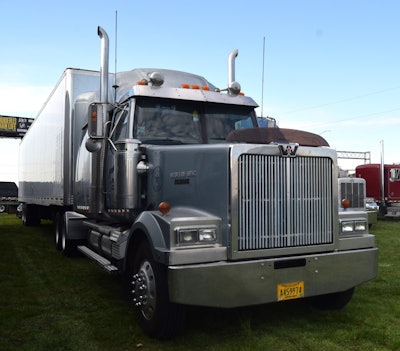 Jay Hosty hauls dry freight in this van with his 2006 Western Star 4900EX, pictured parked up for the Mid-America Trucking Show.
Jay Hosty hauls dry freight in this van with his 2006 Western Star 4900EX, pictured parked up for the Mid-America Trucking Show.
[Related: Don't be a victim: How to guard both personal and business identity to prevent theft]
It's possible a proximity-monitoring feature in Comdata's system helped catch the fraudulent purchase after Hosty's card information was compromised. At once, that feature, detailed by my CCJ colleague Angel Coker in this story, is designed to prevent a fraudulent purchase in close proximity to a previous one, declining the card if within certain distance limits.
Now, though, Comdata has joined some other payments providers with another card-control feature operators and fleets enable directly that, in Hosty's case, certainly could also have prevented the theft from happening to begin with.
Comdata COO Randy Morgan detailed the new "OneClick" feature for Comdata users at the Truckload Carriers Association's Truckload 2024 conference in Nashville, Tennessee, following close on the heels of MATS.
OneClick comes with no added charge for Comdata users and is "built for the masses," said Morgan, whether a one-truck owner-operator or a fleet of 10,000 trucks. "Everybody can use it" to effect. Essentially, when any driver wants to fuel, before presenting the card, he/she opens an app and presses a button to enable to card to be used.
"The fleet [or owner-operator] can determine how long that it stays open," Morgan said. "We shut the card off until the driver needs to fuel again," offering an additional layer of security knowing the card is not active. "It’s simple to use from a customer experience -- when the driver hits it, the button turns from red to green."
[Related: Ex-dispatcher stole $300,000 from truck drivers' fuel cards]
Given the fraudulent $1,100 worth in fuel purchased in Hosty's situation came a significant amount of time after the initial skimming of his card information, it's likely the system could have prevented the thieves' use of the card.
Digital, no-card-presentation-necessary methods of payment (through apps like those of Mudflap, for instance, or Relay Payments) can help an owner-operator avoid fuel card-skimming devices like the one encountered by Hosty. Coker's reporting in CCJ told the story of North Carolina-based Solid Rock Carriers' switch to Relay Payments after the company was hit with $27,000 worth in fuel card-skimming fraud in a single day. Yet that report also showed that the rise in mobile payment is contributing to the profusion of those skimming devices to begin with.
Skimming is a huge part of the mix of varieties of theft:
Based on analysis of fraud cases between January 2022 and now, Comdata has found that card skimming -- the primary fraud method used by external bad actors -- accounts for 75% of fuel fraud. ... The FBI has reported an increase of 700% of card skimming at all businesses. The actual cost of fraud for trucking is unclear, but from conversations with carriers that switched to Relay for fuel payments, they estimated it was costing them $20,000 per month for a fleet that averages 100 trucks, said Relay Co-Founder and President Spencer Barkoff.
As noted by Comdata VP Steve DeMelis, in conversation with Coker, other cardless apps with limited security, though, have aided and abetted fraudsters with card-skimming expertise. “The ability to simply enter a card number into a mobile app and facilitate a transaction has made it significantly easier for fraudsters who previously had to rely on stealing the physical card or going through the process of creating a card to attempt a transaction,” DeMelis said.
If you're not utilizing a cardless system yourself or, as Hosty has more often done in the past, simply paying cash, in the end, if something doesn't feel quite right when you're putting that card in the slot at the pump, beware, the Trucker of the Year said.
While wider adoption of controls like those in the new OneClick feature could change the dynamics, "right now," Hosty said, for him it feels like prevention is "a matter of paying attention when you push that card in."
Read about other new theft prevention/detection features in the RoadFlex fuel analysis service at this link, and catch Coker's story referenced above in CCJ at this link.
Find more identity-protection resources in Overdrive's " Partners in Business" owner-operator handbook's Chapter 7, on "Managing Money." The Overdrive/ATBS coproduction, sponsored in 2024 by Rush Truck Centers, is a resource for both new and established owner-operators, a comprehensive guide to running a small trucking business. Click here to download the updated 2024 edition of the Partners in Business manual free of charge.

